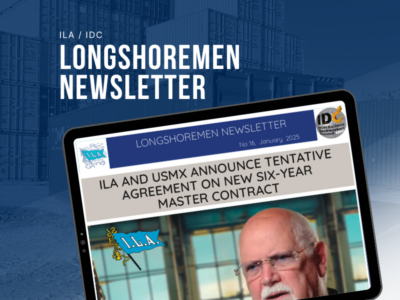I initially hesitated to respond to this “clueless” commentary. However, the author’s glaring lack of knowledge about the maritime industry and his misrepresentation of what the International Longshoremen’s Association (ILA) is fighting for demands correction. His commentary not only fails to grasp the complexities of our work but also perpetuates harmful misconceptions about unions, innovation, and the realities of automation.
1. Union Leaders and Innovation
Claim: “Dock unions stop innovation.”
Response: The ILA has always embraced innovation. Beyond the historic adaptation to containerization, the ILA has supported the implementation of state-of-the-art gate and terminal operating systems, as well as cutting-edge container handling equipment. These advancements have allowed ILA members to handle record volumes over the past four years, demonstrating our commitment to progress and efficiency.
The industry’s challenges do not stem from unions “stopping innovation.” The real issue is capacity. Ports, particularly those in densely populated regions like New York/New Jersey, need more land to expand capacity and improve throughput. Instead of focusing on automation that eliminates jobs, efforts should be directed toward infrastructure investment and sustainable growth strategies.
2. Safety and Dangerous Jobs
Claim: “Automation protects human workers by reducing dangerous jobs.”
Response: This argument is both misleading and uninformed. The majority of serious accidents or fatalities in our industry occur on the break bulk or general cargo side of the business—not in containerized operations where automation is being proposed. Importantly, employers are not seeking automation in those high-risk sectors, which invalidates the argument that automation is needed for safety.
The ILA has led the charge for safer working conditions through training, modern equipment, and strict safety protocols. Suggesting that automation is the only path to safer ports is a gross oversimplification and shows a lack of understanding of the maritime industry.
3. The Myth of “Creative Destruction”
Claim: “Automation will destroy some jobs but create better ones, just like in other industries.”
Response: The author fails to acknowledge that automation in the maritime industry does not follow the same pattern as in other sectors. In industries like manufacturing, automation has created new jobs for technicians and mechanics. However, the ILA already employs these skilled workers, meaning automation in our case results in a net loss of jobs without generating new opportunities. The maritime industry is unique, and blanket comparisons to other sectors ignore this reality.
Furthermore, the idea that displaced workers will seamlessly transition to “better jobs” is naïve. Entire communities rely on the jobs provided by ports, and the economic ripple effects of job losses would devastate families and local businesses.
4. Global Port Rankings and Efficiency
Claim: “American ports are falling behind globally due to unions opposing automation.”
Response: The claim that unions are the reason American ports lag in global rankings is disingenuous. Ports in Asia and the Middle East may rank higher in throughput metrics, but they often operate under labor conditions that would be unacceptable in the United States. These rankings prioritize speed over fairness, safety, and sustainability.
The ILA’s commitment to record-breaking volumes in recent years proves that we are not stopping progress. However, the real bottleneck in the industry is a lack of land and capacity, not a lack of automation. If Port Authorities like New York/New Jersey focused on providing space for expansion rather than engaging in what amounts to legal extortion—forcing terminal operators to profit-share in lease agreements—ports could operate more efficiently. Instead of supporting terminal growth, Port Authorities are creating additional financial burdens that hinder long-term development.
5. Economic Impact of Strikes
Claim: “Strikes by the ILA harm other industries and Americans.”
Response: Strikes are a last resort for the ILA, not a reckless decision. The ILA has repeatedly sought early negotiations to avoid disruptions, but employers have often refused to engage in meaningful discussions. Any short-term impact of a strike is dwarfed by the long-term consequences of allowing automation to hollow out the industry. Protecting workers’ jobs today ensures the economic stability of countless families and communities tomorrow.
6. The Role of Unions in a Fair Economy
Claim: “Unions like the ILA are not ‘pro-worker.’”
Response: Nothing could be further from the truth. The ILA’s fight against automation is not about stopping progress; it is about ensuring that progress benefits everyone, not just corporate bottom lines. The union’s efforts have historically led to safer working conditions, fair wages, and a thriving middle class. By pushing back against automation that eliminates jobs without adding value, the ILA is safeguarding the future of its members and their communities.
Conclusion
The author’s commentary is riddled with inaccuracies and reflects a fundamental misunderstanding of the maritime industry. The ILA has consistently embraced innovation that enhances productivity and safety, as evidenced by our adoption of modern technologies and record-breaking volumes in recent years. The industry’s challenges lie in a lack of capacity and fair business practices—not in unions.
Moreover, automation in our sector will not create new jobs. Unlike in other industries, the ILA already employs skilled mechanics and technicians. Automation here means job losses, plain and simple. Suggesting otherwise is either ignorant or dishonest.
The ILA is not fighting against progress; we are fighting for a future where progress includes workers, their families, and the communities that depend on the maritime industry. If the author had taken the time to understand our industry, he might have recognized that this fight is about fairness, sustainability, and the preservation of a strong middle class. Instead, he has opted for baseless attacks that do nothing to advance the conversation or address the real challenges facing American ports.
We welcome a more informed dialogue, but this article falls far short of contributing anything meaningful to that discussion.







Leave a Reply